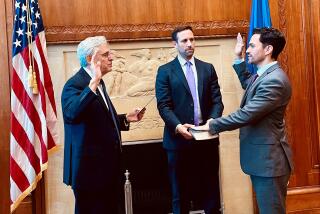Microsoft Lawyer in Antitrust Role
Stung by unfavorable court rulings, Microsoft Corp. has positioned one of its top lawyers to run a legal committee that would influence how much oversight U.S. courts may exercise in antitrust settlements like the one the company negotiated with the Bush administration.
This summer, Microsoft associate general counsel Richard J. Wallis will become chairman of the American Bar Assn.âs antitrust section, an unusual role for a corporate lawyer.
The panel is already organizing opposition to a congressional plan requiring more aggressive oversight by the courts of antitrust settlements like the one in the Microsoft case.
The bar associationâs antitrust group is âextremely influential in terms of development of antitrust policy and law,â said Glenn B. Manishin, a Washington antitrust lawyer. But he said Wallis would not be able to advance Microsoftâs interests as head of the group.
Microsoft said Wallis was traveling Thursday and could not be reached for comment.
The bar associationâs antitrust section warned lawyers last month of legislation that would block judges from approving antitrust settlements without âreasonable beliefâ and âsubstantial evidenceâ that such a deal is in the publicâs interest.
The lawyersâ group said the proposal was unnecessary and that it was ânot aware of any problemsâ with the current antitrust procedures.
Andrew Gavil, a law professor at Howard University, said the congressional proposal âseemed to be a clear response to the Microsoft experience.â
The dispute over adequate judicial oversight is central to an important ruling expected as early as today from the U.S. Court for the District of Columbia Circuit, which is considering whether the landmark settlement Microsoft negotiated with the Justice Department in late 2001 was tough enough.
The court could force fundamental changes to Microsoftâs Windows software, the engine for hundreds of millions of personal computers worldwide.
Massachusetts, the only holdout state that continues to press for tougher sanctions against Microsoft, has argued that the settlement was so profoundly flawed that it represented an abuse of the trial judgeâs discretion.
It wants the appeals court to review the settlement to determine whether the sanctions against Microsoft were adequate. The court is considering its role overseeing the antitrust settlement.






